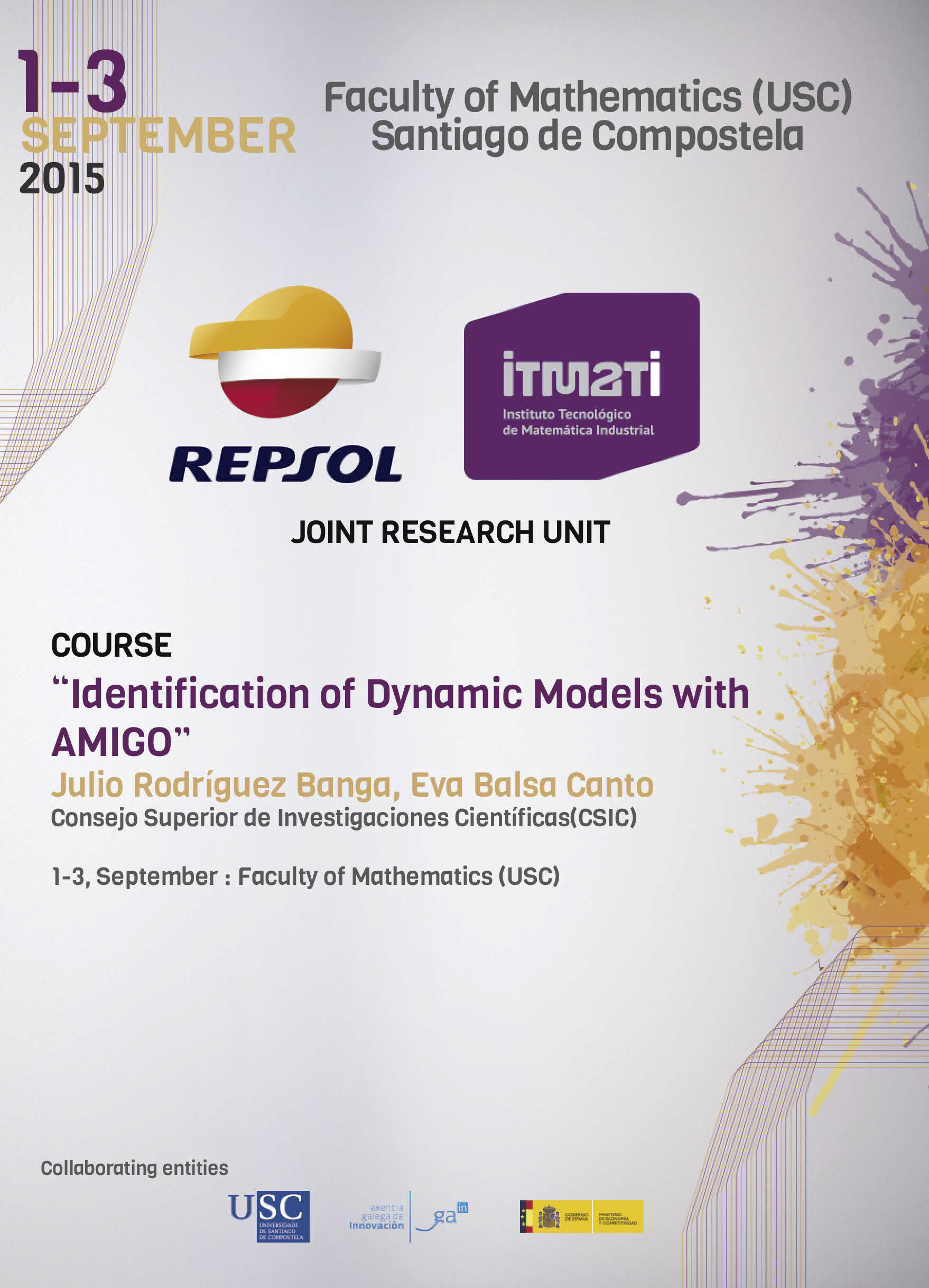Curso: Identification of Dynamic Models with AMIGO
Del 1 al 3 de septiembre de 2015, tendrá lugar el Curso Identification of dynamic models with AMIGO. El curso tendrá lugar en el Aula 5 de la Facultad de Matemáticas de la Universidad de Santiago de Compostela (USC), de 9:00 a 14:00.
- DESCRIPTION: this course considers the identification of dynamic models described by deterministic differential equations. Emphasis will be made on kinetic models describing (bio) chemical reaction networks.
PART 1: An overview of the theoretical fundamentals and the state of the art regarding numerical methods. Concepts will be presented taken into account different perspectives. We will focus on the key issues of non-convexity, uniqueness, identifiability and overfitting.
- Introduction to reverse engineering of dynamic models
- Perspective from inverse problem theory and statistics
- Perspective from system identification and optimization
- Perspective from chemical reaction network theory
- Perspective from machine learning
-
Guidelines for proper indentification of dynamic (kinetic) models
PART 2: The AMIGO toolbox, giving details on the methods implemented and their use.
- Theoretical background: Introduction to parametric model identification: the model identification loop. AMIGO: General overview; Installation; Data structures; Startup.
- Theoretical background: Simulation and sensitivity analysis; Rank of parameters. AMIGO: Input file for simulation; For a given example: Simulation; Sensitivity analysis; Global / local rank of Parameters with an illustrative example
- Theoretical background: Parameter estimation; Cost function definition and methods. AMIGO: Input file for parameter estimation; For a given example: Solve the parameterestimation problem with different cost functions (LSQ, LLK) and different optimizers (local method, multistart and global method).
- Theoretical background: Identifiability abalysis; FIM based methods; Sampling methods. AMIGO: For a given example: Find confidence intervals local approach, sampling approach.
- Theoretical background: Optimal experimental design. AMIGO: Input file. For a given example: Find experimental conditions to improve identifiability compare results with non-optimal experiments.
- Theoretical background: Dynamic optimization. AMIGO: Input file. Solve an example with CVP, different discretization levels, mesh refining.
- COORDINADOR ACADÉMICO DEL CURSO: José Luis Ferrín González (Profesor Titular, Departamento de Matemática Aplicada, USC, e investigador adscrito a ITMATI).
- HORARIO
| Fecha | Clase | Ponente | Horario |
| 01 de septiembre | Clase teórica | Julio Rodríguez Banga, Profesor Investigación, CSIC | 9:00-14:00 |
| 02 de septiembre | Clase teórica y práctica | Eva Balsa Canto, Científico Titular, CSIC | 9:00-14:00 |
| 03 de septiembre | Clase teórica y práctica | Eva Balsa Canto, Científico Titular, CSIC | 9:00-14:00 |
Este curso se retransmitirá en directo por el sistema de videoconferencia de Aula Máster y en el siguiente portal. http://193.144.34.42/videos/
Este curso se enmarca como actividad en la Unidad Mixta de Investigación Repsol-ITMATI que cuenta con la financiación de la Agencia Gallega de Innovación y del Ministerio de Economía y Competitividad en el marco de la Estrategia Española de Innovación en Galicia.
-
INSCRIPCIONES: Inscripción gratuita. Pueden confirmar su asistencia en el siguiente formulario de inscripción (PINCHE AQUÍ) antes del 28 de agosto.
Se entregará un certificado de asistencia para aquellos que lo soliciten.
Fecha:
Mar, 2015-09-01 09:00 - Jue, 2015-09-03 14:00
Lugar:
Aula 5, Facultad de Matemáticas de la Universidad de Santiago de Compostela
Organizador:
ITMATI, Repsol 








